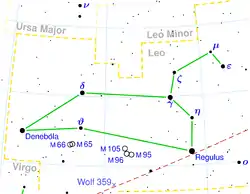Omicron Leonis
Omicron Leonis (ο Leonis, abbreviated Omicron Leo, ο Leo) is a multiple star system in the constellation of Leo, west of Regulus, some 130 light-years from the Sun, where it marks one of the lion's forepaws.
 Omicron Leonis is located to the lower far right on this map of the constellation. | |
| Observation data Epoch J2000.0 Equinox J2000.0 | |
|---|---|
| Constellation | Leo |
| Right ascension | 09h 41m 09.03s |
| Declination | +09° 53' 32.30" |
| Apparent magnitude (V) | +3.52[1] |
| Characteristics | |
| Spectral type | F8-G0III + A7m[2] |
| U−B color index | 0.21[1] |
| B−V color index | 0.49[1] |
| Astrometry | |
| Proper motion (μ) | RA: -143.20[3] mas/yr Dec.: -37.20[3] mas/yr |
| Parallax (π) | 25.03[3] ± 0.22 mas |
| Distance | 135 ly (41.4±0.1[4] pc) |
| Absolute magnitude (MV) | +0.51[5] |
| Orbit[4] | |
| Period (P) | 14.498064 ± 0.000009 days |
| Semi-major axis (a) | 4.46 ± 0.01 mas |
| Eccentricity (e) | 0 |
| Inclination (i) | 57.6 ± 0.1° |
| Longitude of the node (Ω) | 191.4 ± 0.1° |
| Periastron epoch (T) | TJD 10629.831 ± 0.003 |
| Details[4] | |
| ο Leo A | |
| Mass | 2.12 M☉ |
| Radius | 5.9±0.5 R☉ |
| Luminosity | 39.4±2.4 L☉ |
| Temperature | 6,000±200 K |
| Age | 800(estimate) Myr |
| ο Leo B | |
| Mass | 1.87±0.01 M☉ |
| Radius | 2.2±0.3 R☉ |
| Luminosity | 15.4±1.0 L☉ |
| Temperature | 7,600±400 K |
| Other designations | |
| Database references | |
| SIMBAD | data |
It consists of a binary pair, designated Omicron Leonis A and an optical companion, Omicron Leonis B.[6] A's two components are themselves designated Omicron Leonis Aa (officially named Subra /ˈsuːbrə/, the traditional name for the system)[7][8] and Ab.
Nomenclature
ο Leonis (Latinised to Omicron Leonis) is the star's Bayer designation. The designations of the two constituents as Omicron Leonis A and B, and those of A's components—Omicron Leonis Aa and Ab—derive from the convention used by the Washington Multiplicity Catalog (WMC) for multiple star systems, and adopted by the International Astronomical Union (IAU).[9]
It bore the traditional name Subra, from the Arabic زبرة zubra (upper part of the back), originally applied to Delta and Theta Leonis.[10]
In 2016, the International Astronomical Union organized a Working Group on Star Names (WGSN)[11] to catalogue and standardize proper names for stars. The WGSN decided to attribute proper names to individual stars rather than entire multiple systems.[12] It approved the name Subra for the component Omicron Leonis Aa on 12 September 2016 and it is now so included in the List of IAU-approved Star Names.[8]
Properties
The primary is given the type F8-G0III giant and the secondary is a type A7m dwarf.[4] Their combined apparent magnitude is +3.52.
References
- Ducati, J. R. (2002). "VizieR Online Data Catalog: Catalogue of Stellar Photometry in Johnson's 11-color system". CDS/ADC Collection of Electronic Catalogues. 2237: 0. Bibcode:2002yCat.2237....0D.
- Ginestet, N.; Carquillat, J. M. (2002). "Spectral Classification of the Hot Components of a Large Sample of Stars with Composite Spectra, and Implication for the Absolute Magnitudes of the Cool Supergiant Components". The Astrophysical Journal Supplement Series. 143 (2): 513. Bibcode:2002ApJS..143..513G. doi:10.1086/342942.
- Van Leeuwen, F. (2007). "Validation of the new Hipparcos reduction". Astronomy and Astrophysics. 474 (2): 653–664. arXiv:0708.1752. Bibcode:2007A&A...474..653V. doi:10.1051/0004-6361:20078357. S2CID 18759600.
- Hummel, C. A.; Carquillat, J. -M.; Ginestet, N.; Griffin, R. F.; Boden, A. F.; Hajian, A. R.; Mozurkewich, D.; Nordgren, T. E. (2001). "Orbital and Stellar Parameters of Omicron Leonis from Spectroscopy and Interferometry". The Astronomical Journal. 121 (3): 1623. Bibcode:2001AJ....121.1623H. doi:10.1086/319391.
- Anderson, E.; Francis, Ch. (2012), "XHIP: An extended hipparcos compilation", Astronomy Letters, 38 (5): 331, arXiv:1108.4971, Bibcode:2012AstL...38..331A, doi:10.1134/S1063773712050015, S2CID 119257644.
- "Washington Double Star Catalog". United States Naval Observatory. Archived from the original on 14 February 2011. Retrieved 2 January 2018.
- Kunitzsch, Paul; Smart, Tim (2006). A Dictionary of Modern star Names: A Short Guide to 254 Star Names and Their Derivations (2nd rev. ed.). Cambridge, Massachusetts: Sky Pub. ISBN 978-1-931559-44-7.
- "Naming Stars". IAU.org. Retrieved 16 December 2017.
- Hessman, F. V.; Dhillon, V. S.; Winget, D. E.; Schreiber, M. R.; Horne, K.; Marsh, T. R.; Guenther, E.; Schwope, A.; Heber, U. (2010). "On the naming convention used for multiple star systems and extrasolar planets". arXiv:1012.0707 [astro-ph.SR].
- Jim Kaler's website: http://stars.astro.illinois.edu/sow/subra.html (online 6th Sep 2015)
- IAU Working Group on Star Names (WGSN), International Astronomical Union, retrieved 22 May 2016.
- "WG Triennial Report (2015-2018) - Star Names" (PDF). p. 5. Retrieved 2018-07-14.
External links
- Omicron Leo/Subra in Kaler Stars
- Subra (HIP 47508) Relates to the A star, Subra-B
- Subra - Omi Leonis brief data.